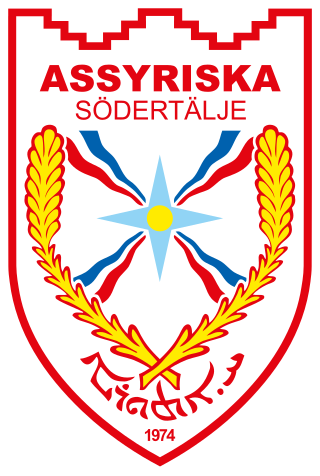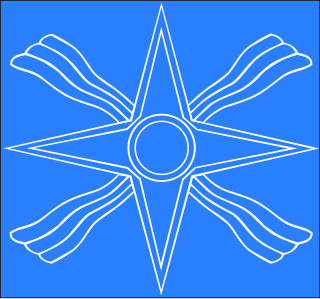Related Research Articles

Bashar al-Assad is a Syrian politician, military officer, and former dictator who served as the 19th president of Syria from 2000 until his government was overthrown by Syrian rebels in December 2024. As president, Assad was commander-in-chief of the Syrian Arab Armed Forces and secretary-general of the Central Command of the Arab Socialist Ba'ath Party. He is the son of Hafez al-Assad, who ruled Syria from 1971 until his death in 2000.

Allsvenskan is a Swedish professional league for men's association football clubs. It was founded in 1924 and is the top tier of the Swedish football league system, operating on a system of promotion and relegation with Superettan. Seasons run from late March or early April to the beginning of November, with the 16 clubs all meeting each other twice, resulting in a 30-match season, for a total of 240 matches league-wide.

Assyriska Fotbollsföreningen, also known simply as Assyriska FF, is a Swedish football club based in Södertälje, Stockholm County. The club, formed in 1974 by Assyrian immigrants, has advanced through the league system and is currently playing in the fourth highest Swedish league, Division 2. They played in the highest Swedish football league Allsvenskan in 2005 where their games were broadcast in over 80 countries. The club has also played a final in Svenska Cupen, which was lost against IF Elfsborg in 2003.

Superettan (Swedish pronunciation:[ˈsʉ̂ːpɛrˌɛtːan]; meaning the super first (division)) is an association football league and the second highest league in the league system of Swedish men's football. Contested by 16 clubs, it operates on a system of promotion and relegation with Allsvenskan and Division 1. Seasons run from April to October, with teams playing 30 matches each, totalling 240 matches in the season.

Assyrian Democratic Organization (ADO) (Syriac: ܡܛܟܣܬܐ ܐܬܘܪܝܬܐ ܕܝܡܩܪܛܝܬܐ; Arabic: المنظمة الآثورية الديمقراطية), also known as "Mtakasta/Mtakasto", is an Assyrian political party based in Syria. Founded in 1957, it is the oldest Assyrian political party in Syria, and was established as a national, political and democratic movement with the objectives of safeguarding the existence of the Assyrian people, as well as the realization of their legitimate national aspirations (political, cultural, administrative) in their historic homeland.

Syrianska Football Club, also known as Syrianska FC or simply Syrianska, is a Swedish professional football club based in Södertälje in Stockholm County. The club was founded by Syriac-Aramean immigrants in 1977 as Suryoyo Sportklubb, or Suryoyo SK. In 1986, its name was changed to Syrianska SK. The club adopted its present name as it grew and advanced through the league system. In 2010, after two years in Superettan, Syrianska was promoted to Allsvenskan for the first time in club history. This made Syrianska FC the 61st team to play in Allsvenskan. Since the Syriac people do not have an official national team, Syrianska is often seen as a substitute.

Skövde AIK is a Swedish football club from Skövde. It was founded on 21 June 1919. In 2024 the club plays in Superettan, which is the 17th season in Superettan for the club.
Oke Akpoveta is a Nigerian footballer who as a forward for Division 3 club Åstorps FF.
Karl Albin Elis "Kalle" Holmberg is a Swedish professional footballer who plays as a forward for Örebro SK. He was the topscorer during the 2017 Allsvenskan season, which earned him a call-up to the Sweden national team.

Ahmed Yasin Ghani Mousa, known as Ahmed Yasin, is an Iraqi footballer who plays for Swedish club Örebro and the Iraq national team. He joined the Iraqi national team for first time in 2012, after having played for the Iraq U23 team.
The 2017 Superettan was part of the 2017 Swedish football season, and the 18th season of Superettan, Sweden's second-tier football division in its current format. A total of 16 teams contest the league.
Basketettan is the third tier league of professional basketball in Sweden. Until 2017, it was the second-tier league before it was replaced by Superettan. The winner of each Basketettan season is promoted to Superettan.
The 2018 Superettan was part of the 2018 Swedish football season, and the 19th season of Superettan, Sweden's second-tier football division in its current format. A total of 16 teams contest the league.
The 2019 Allsvenskan, part of the 2019 Swedish football season, was the 95th season of Allsvenskan since its establishment in 1924. A total of 16 teams participated. AIK were the defending champions after winning the title in the previous season.
The 2019 Superettan was part of the 2019 Swedish football season, and the 20th season of Superettan, Sweden's second-tier football division in its current format. A total of 16 teams contest the league.
Dijan Vukojević is a Swedish professional footballer who plays as an attacking midfielder or winger for Polish club Wieczysta Kraków.
The 2021 Superettan was part of the 2021 Swedish football season, and the 22nd season of Superettan, Sweden's second-tier football division in its current format. A total of 16 teams contested the league.
Fredrik Oscar Olle Uddenäs is a Swedish professional footballer who plays as a winger for AIK on loan from the Dutch club Excelsior.
The 2023 Allsvenskan was the 99th season of Sweden's top-level football league, Allsvenskan. A total of 16 teams participated. BK Häcken were the defending champions after winning the title in the previous season. IF Brommapojkarna and Halmstads BK were promoted after finishing first and second in the 2022 Superettan, while Varbergs BoIS staved off relegation by defeating third placed Östers IF.
References
- ↑ Assad Al Hamlawi at Soccerway. Retrieved 8 August 2023.
- ↑ "Assad Al Hamlawi". Fotbolltransfers.com. Retrieved 17 July 2022.
- ↑ "Superettan 2024 Skytteliga, Assistliga, Poängliga, Gula kort & Utvisningar - Fotboll Herr". www.everysport.com (in Swedish). Retrieved 4 December 2024.
